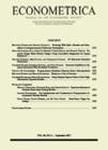-
作者:Kubler, F; Schmedders, K
作者单位:Stanford University; Northwestern University
摘要:We consider an infinite-horizon exchange economy with incomplete markets and collateral constraints. As in the two-period model of Geanakoplos and Zame (2002), households can default on their liabilities at any time, and financial securities are only traded if the promises associated with these securities are backed by collateral. We examine an economy with a single perishable consumption good, where the only collateral available consists of productive assets. In this model, competitive equili...
-
作者:Robinson, PM; Hualde, J
摘要:Cointegrated bivariate nonstationary time series are considered in a fractional context, without allowance for deterministic trends. Both the observable series and the cointegrating error can be fractional processes. The familiar situation in which the respective integration orders are I and 0 is nested, but these values have typically been assumed known. We allow one or more of them to be unknown real values, in which case Robinson and Marinucci (2001, 2003) have justified least squares estim...
-
作者:Ai, CR; Chen, XH
作者单位:State University System of Florida; University of Florida; New York University
摘要:We propose an estimation method for models of conditional moment restrictions, which contain finite dimensional unknown parameters (theta) and infinite dimensional unknown functions (h). Our proposal is to approximate h with a sieve and to estimate theta and the sieve parameters jointly by applying the method of minimum distance. We show that: (i) the sieve estimator of h is consistent with a rate faster than n(-1/4) under certain metric; (ii) the estimator of theta is rootn consistent and asy...
-
作者:Ghirardato, P; Maccheroni, F; Marinacci, M; Siniscalchi, M
摘要:We provide a simple behavioral definition of 'subjective mixture' of acts for a large class of (not necessarily expected-utility) preferences. Subjective mixtures enjoy the same algebraic properties as the 'objective mixtures' used to great advantage in the decision setting introduced by Anscombe and Aumann (1963). This makes it possible to formulate mixture-space axioms in a fully subjective setting. For illustration, we present simple subjective axiomatizations of some models of choice under...
